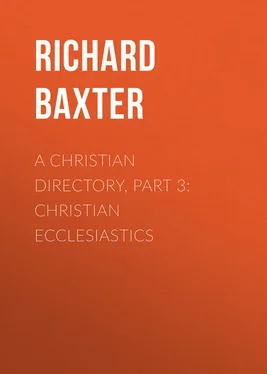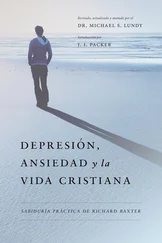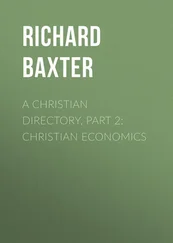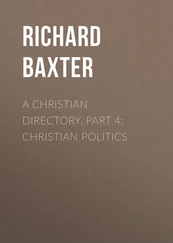Richard Baxter - A Christian Directory, Part 3 - Christian Ecclesiastics
Здесь есть возможность читать онлайн «Richard Baxter - A Christian Directory, Part 3 - Christian Ecclesiastics» — ознакомительный отрывок электронной книги совершенно бесплатно, а после прочтения отрывка купить полную версию. В некоторых случаях можно слушать аудио, скачать через торрент в формате fb2 и присутствует краткое содержание. Жанр: foreign_antique, foreign_prose, на английском языке. Описание произведения, (предисловие) а так же отзывы посетителей доступны на портале библиотеки ЛибКат.
- Название:A Christian Directory, Part 3: Christian Ecclesiastics
- Автор:
- Жанр:
- Год:неизвестен
- ISBN:нет данных
- Рейтинг книги:3 / 5. Голосов: 1
-
Избранное:Добавить в избранное
- Отзывы:
-
Ваша оценка:
- 60
- 1
- 2
- 3
- 4
- 5
A Christian Directory, Part 3: Christian Ecclesiastics: краткое содержание, описание и аннотация
Предлагаем к чтению аннотацию, описание, краткое содержание или предисловие (зависит от того, что написал сам автор книги «A Christian Directory, Part 3: Christian Ecclesiastics»). Если вы не нашли необходимую информацию о книге — напишите в комментариях, мы постараемся отыскать её.
A Christian Directory, Part 3: Christian Ecclesiastics — читать онлайн ознакомительный отрывок
Ниже представлен текст книги, разбитый по страницам. Система сохранения места последней прочитанной страницы, позволяет с удобством читать онлайн бесплатно книгу «A Christian Directory, Part 3: Christian Ecclesiastics», без необходимости каждый раз заново искать на чём Вы остановились. Поставьте закладку, и сможете в любой момент перейти на страницу, на которой закончили чтение.
Интервал:
Закладка:
Direct. VIII. Let the manner of your worshipping God be suited to the matter that you have in hand. Remember that you are speaking either to or of the eternal God; that you are employed about the everlasting salvation of your own or others' souls; that all is high and holy that you have to do: see then that the manner be answerable hereunto.
Direct. IX. Offer God nothing as a part of worship which is a lie; much less so gross a lie as to be disproved by the common senses and reason of all the world. God needeth not our lie unto his glory. 24 24 Rom. iii. 7.
What worship then do papists offer him in their mass, who take it for an article of their faith, that there is no bread or wine left after the consecration, it being all transubstantiate into the very body and blood of Christ? And when the certainty of all men's senses is renounced, then all certainty of faith and all religion is renounced; for all presuppose the certainty of sense.
Direct. X. Worship not God in a manner that is contrary to the true nature, and order, and operations of a rational soul. I mean not to the corrupted nature of man, but to nature as rational in itself considered. As, 1. Let not your mere will and inclination overrule your understandings; and say not as blind lovers do, I love this, but I know not why; or children that eat unwholesome meat, because they love it. 25 25 Read Plutarch of Superstition.
2. Let not passion overtop your reason: worship God with such a zeal as is according to knowledge. 3. Let not your tongues lead your hearts, much less overgo them: words may indeed reflect upon the heart, and warm it more; but that is but the secondary use: the first is to be the expressions of the heart: you must not speak without or against your hearts, (that is, falsely,) that by so speaking you may better your hearts (and make the words true, that at first were not true); unless it be when your words are but reading recitations or narratives, and not spoken of yourselves. The heart was made to lead the tongue, and the tongue to express it, and not to lead it. Therefore speak not to God either the words of a parrot, which you do not understand, or the words of a liar or hypocrite, which express not the meaning, or desires, or feeling of your hearts: but first understand and feel what you should speak, and then speak that which you understand and feel.
Quest. How then can a prayer be lawful that is read or heard from a book?
Answ. There is in reading the eye, and in hearing the ear, that is first to affect the heart, and then the tongue is to perform its office. And though it be sudden, yet the passage to the heart is first, and the passage from the heart is last: and the soul is quick, and can quickly thus both receive and be affected and express itself. And the case is the same in this, whether it be from a book, or from the words of another without book: for the soul must do the same, as quickly, in joining with another that speaketh before us, without a book as with it.
How far the Scripture is the law or rule of worship and discipline, and how far not.
Direct. XI. Understand well how far Christ hath given a law and a rule for worship to his church in the holy Scriptures, and so far see that you take it as a perfect rule, and swerve not from it by adding or diminishing. This is a matter of great importance by reason of the danger of erring on either side. 1. If you think that the Scripture containeth not any law or rule of worship at all, or not so much as indeed it doth, you will deny a principal part of the office of Christ, as the King and Teacher of the church, and will accuse his laws of insufficiency, and be tempted to worship him with a human kind of worship, and to think yourselves at liberty to worship him according to your own imaginations, or change his worship according to the fashion of the age or the country where you are. And on the other side, if you think that the Scripture is a law and rule of worship, more particular than Christ intended it, you will involve yourselves and others in endless scruples and controversies, and find fault with that which is lawful and a duty, because you find it not particularly in the Scripture: and therefore it is exceeding needful to understand how far it is intended to be herein our law and rule, and how far not: to handle this fully would be a digression, but I shall briefly answer it.
1. No doubt but Christ is the only universal Head and Lawgiver to his church. 26 26 Isa. ii. 3; i. 10; xlii. 4; Mic. iv. 2; Heb iii. 2, 3, 5; x. 28: Acts vii. 37, 38; iii. 23; Psal. xix. 7; Isa. v. 24.
And that legislation is the first and principal part of government: and therefore if he had made no laws for his church, he were not the full governor of it. And therefore he that arrogateth this power to himself to be lawgiver to the church universal (as such) doth usurp the kingly office of Christ, and committeth treason against his government; (unless he can prove that Christ hath delegated to him this chief part of his government, which none can do;) there being no universal lawgiver to the church but Christ, (whether pope or council,) no law that is made by any mere man can be universally obligatory. Therefore seeing the making of all universal laws doth belong only to Christ, we may be sure that he hath perfectly done it; and hath left nothing out of his laws that was fit to be there, nor nothing at liberty that was fit to be determined and commanded. Therefore whatsoever is of equal use or consideration to the universal church, as it is to any one part of it, and to all times as it is to any time of the church, should not be made a law by man to any part of the church, if Christ have not made it a law to the whole: because else they accuse him of being defective in his laws, and because all his subjects are equally dependent on him as their King and Judge. And no man must step into his throne pretending to amend his work which he hath done amiss, or to make up any wants which the chief Lawgiver should have made up.
2. These laws of Christ for the government of his church, are fully contained in the holy Scriptures; for so much as is in nature, is there also more plainly expressed than nature hath expressed it. All is not Christ's law that is any way expressed in Scripture; but all Christ's laws are expressed in the Scriptures; not written by himself, but by his Spirit in his apostles, whom he appointed and sent to teach all nations to observe whatever he commanded them, Matt. xxviii. 20: who being thus commissioned and enabled fully by the Spirit to perform it, are to be supposed to have perfectly executed their commission; and to have taught whatsoever Christ commanded them, and no more as from Christ: and therefore as they taught that present age by voice, who could hear them, so they taught all ages after to the end of the world by writing, because their voice was not by them to be heard.
3. So far then as the Scripture is a law and rule, it is a perfect rule; but how far it is a law or rule, its own contents and expressions must determine. As, (1.) It is certain that all the internal worship of God (by love, fear, trust, desire, &c.) is perfectly commanded in the Scriptures. (2.) The doctrine of Christ which his ministers must read and preach is perfectly contained in the Scriptures. (3.) The grand and constantly necessary points of order in preaching, are there also expressed: as that the opening of men's eyes, and the converting of them from the power of Satan to God, be first endeavoured, and then their confirmation and further edification, (4.) Also that we humble ourselves before God in the confession of our sins. (5.) And that we pray to God in the name of Christ for mercy for ourselves and others. (6.) That we give God thanks for his mercies to the church, ourselves, and others. (7.) That we praise God in his excellencies manifested in his word and works of creation and providence. (8.) That we do this by singing psalms with holy joyfulness of heart. (9.) The matter and order of the ordinary prayers and praises of christians is expressed in the Scripture (as which parts are to have precedency in our estimation and desire, and ordinarily in our expressions). (10.) Christ himself hath determined that by baptizing them into the name of the Father, the Son, and the Holy Ghost, men be solemnly entered into his covenant, and church, and state of christianity. (11.) And he hath himself appointed that his churches hold communion with him and among themselves, in the eucharistical administration of the sacrament of his body and blood, represented in the breaking, delivering, receiving, and eating the consecrated bread, and in the pouring out, delivering, receiving, and drinking the consecrated wine. (12.) And as for the mutable, subservient circumstances, and external expressions, and actions, and orders, which were not fit to be, in particular, the matter of a universal law, but are fit in one place, or at one time, and not another, for these he hath left both in nature and Scripture such general laws, by which upon emergent occasions they may be determined; and by particular providences he fitteth things, and persons, and times, and places, so as that we may discern their agreeableness to the descriptions in his general laws: as that all things be done decently, in order, and to edification, and in charity, unity, and peace. And he hath forbidden generally doing any thing undecently, disorderly, to the hurt or destruction of our brethren, even the weak, or to the division of the church. 27 27 Rom. xiii. 9; Matt. xxii. 37; Isa. viii. 16, 20; Acts viii. 25; xv. 35, 36; xxvi. 17, 18; 1 John i. 9; Neh. i. 6; Lev. xvi. 21; Phil. iv. 6; Psal. l. 14; lxix. 30; c. 1, 2, 4; Eph. v. 19; Psal. ix. 11; xcv. 1; Luke xi. 2, 3, &c.; Matt. xxviii. 19; 1 Cor. xi. 23-26, 28; xiv. 5, 12, 26; 2 Cor. x. 8; xiii. 10; Rom. xv. 2; 1 Cor. xiv. 40; Rom. xiv. 15, 20; 1 Cor. ix. 20-22; viii. 10; x. 19, 28; 2 Cor. vi. 16.
(13.) And many things he hath particularly forbidden in worship: as making to ourselves any graven image, &c. and worshipping angels, &c. 28 28 Second commandment, Col. ii. 18, &c.; 1 John v. 21; Rev. ii. 14.
Интервал:
Закладка:
Похожие книги на «A Christian Directory, Part 3: Christian Ecclesiastics»
Представляем Вашему вниманию похожие книги на «A Christian Directory, Part 3: Christian Ecclesiastics» списком для выбора. Мы отобрали схожую по названию и смыслу литературу в надежде предоставить читателям больше вариантов отыскать новые, интересные, ещё непрочитанные произведения.
Обсуждение, отзывы о книге «A Christian Directory, Part 3: Christian Ecclesiastics» и просто собственные мнения читателей. Оставьте ваши комментарии, напишите, что Вы думаете о произведении, его смысле или главных героях. Укажите что конкретно понравилось, а что нет, и почему Вы так считаете.












